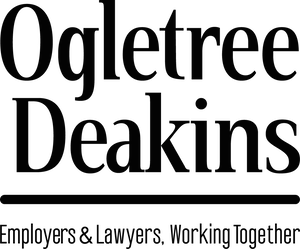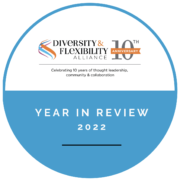Highlighting Flexibility & Diversity Initiatives: Ogletree Deakins
From time to time, we will be highlighting our member firms and corporations who we believe are leading the way in flexibility and diversity initiatives. Recently, Alliance President & CEO Manar Morales spoke with Matt Keen, Managing Shareholder, and Michelle Wimes, Director of Professional Development and Inclusion, at Ogletree, Deakins, Nash, Smoak & Stewart, P.C. about the work they have done with their firm’s flexibility policy and the creation of two Reduced Hours Advisor positions. The following are excerpts from their discussion:
 Morales: What was the impetus for creating a formal flex policy?
Morales: What was the impetus for creating a formal flex policy?
Keen: It was an evolution over time. As more women have taken shareholder, equity shareholder, and leadership positions, our awareness has been heightened. When Michelle was hired five years ago, we adopted a more formal flex policy so that all our attorneys would know what was available.
Wimes: While we’ve always informally tried to accommodate anyone who wanted to work flexibly, we wanted to make it more formal so that everyone in all offices knew about the option. We created the Reduced Hours Advisor positions to increase communication to all regions and to provide support to those working flexible schedules. Now we have two Reduced Hours Advisors – Kelly Hughes on the East Coast and Terry Egler on the West Coast – who have been through the process of working flexibly and can provide coaching and mentoring to others. Both hold quarterly calls with their assigned regions and provide practical advice and positive reinforcement to others.
Morales: How did you build positive support for the flex initiative?
Wimes: We have always had support from the top. In fact, our previous Chair, Kim Ebert, wrote our first reduced hours policy. When I came on board we created an option for equity shareholders to work reduced hours. We made sure that all the managing shareholders were aware of the policy and were available to answer questions in their offices. We tried to have a strategic, coordinated communications plan that started at the top and trickled down to office managing shareholders and then attorneys. We used our intranet site and a booth at our attorney retreat to make sure everyone knew about the initiatives we were rolling out.
Morales: Some firms struggle with having someone on a reduced hours schedule becoming an equity shareholder – how have you made that possible?
Keen: We have clearly established that there is no limitation to an attorney’s ability to succeed and advance in the firm while on reduced hours. For the most part, the attorneys who have worked reduced hours have been extremely successful and productive.
Wimes: Both Matt and Kim previously have had an open door policy and do such a great job of talking to all the lawyers and managing shareholders in all the offices and trying to learn where the pain points are. People aren’t afraid to have those conversations with our leaders. Their leadership style and approachability have really helped with diversity and flexibility issues.
Morales: What impact has flex had on your diversity initiative?
Wimes: In terms of impact on retention, I think it has been a positive. Now that people feel more comfortable coming in and taking advantage of the flex policy it has enabled us to continue to employ people we would have lost. We are proud of the fact that we always exceed the national average for women attorneys. We believe that the numbers speak for themselves in terms of creating a culture where women can thrive and anyone who wants flex can work out different options. Our percentage of newly elected women shareholders has gone up consistently – 60% in 2013, 61% in 2014, and 70% last year. We are starting to get recognized nationally for our initiatives and we received the Gold Standard Certification from WILEF for the first time. This evolution has created an environment that welcomes women lawyers.
Keen: An example is a female attorney who joined the firm as a reduced hours Of Counsel and in a short amount of time moved to Shareholder and then Equity Shareholder and now the Board of Directors – we were able to recruit her with our flex policy. Her success illustrates how successful that program can be.
Morales: Have you seen that the flex policy also impacts business?
Keen: From a business perspective, I think we benefit from having these attorneys stay with the firm. I was speaking with a Shareholder last week who had been at 75% for a number of years and now her kids’ schedules have allowed her to go back to full-time, so within one phone call she went from 75 to 100%. We were able to retain her and she is highly productive and we will continue to reap benefits from being cooperative with her.
Morales: Are there particular resources the Alliance has provided that have been helpful?
Wimes: Your suggestion that we employ Reduced Hours Advisors has had the greatest impact for us. It is so helpful for us to have a point person who people can turn to for issues and challenges they are facing or even if they are just thinking about working a reduced schedule and figuring out the practical things you need to do. We are actively looking at the other recommendations you made on our 2015 Flexibility Benchmarking Survey Report, like having a formal telecommuting policy. We are also beginning to take advantage of the Alliance’s webinars, newsletter, and the conference. We are hoping to make this information more readily available, especially for the reduced hours attorneys. Creating forums for positive, continuing dialogue on the issues is important.
Morales: Are there other things you’re looking forward to on the horizon for the next five years?
Wimes: We did a climate survey five years ago that asked our lawyers questions about diversity and inclusion, professional development, and flexibility. We are planning to do another climate survey in the first couple of months in 2017 to take the temperature of the firm and see where we are five years later. We hope to build another strategic plan where we address the Alliance’s recommendation to include a telecommuting policy within our holistic flex policy. Another thing you talked about is a flex affinity group. We currently have five that are very active now, the women’s group, the black lawyers’ group, as well as Hispanic, Asian, and LGBT groups. It’s the right time to talk about having a flex affinity group and see if that is something people would be receptive to.
We recently promoted a member of the Diversity & Inclusion team to be a diversity analyst – she can concentrate 100% of her time on metrics and tracking this data for us and sharing it with the D&I steering committee and the board. It has been amazing the level of detail and substantive conversations we can have at a committee level based on that information she pulls together.
— — —
Thanks to both Matt and Michelle for sharing insights into Ogletree Deakins’ flex policy!
Does your organization have an innovative flexibility or diversity initiative? Contact Jane Caldeira for information on how your organization can be featured in an upcoming interview.





